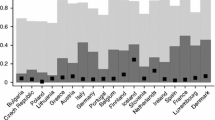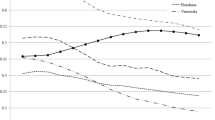Abstract
This study develops and tests three long-standing propositions about the relationship between grievance-handling behavior and political outcomes in a local union: (1) more favorable grievance handling enhances the steward’s likelihood of re-election; (2) the more the political support obtained in an election, the greater the steward’s ability to affect grievance outcomes favorably; and (3) as the relationship between management and the union evolves, grievance handling becomes more efficient and effective. Data on grievances and election results of Ford-UAW Local 400 from the 1950s were used to test hypotheses derived from these propositions; most received substantial, significant support.
Similar content being viewed by others
References
Gamm, Sara. “The Election Base of National Union Executive Boards.”Industrial and Labor Relations Review 32 (April 1979): 295–311.
Greenberg, Jerald. “A Taxonomy of Organizational Justice Theories.”Academy of Management Review 12 (January 1987): 9–22.
Katz, Harry, and Charles Sabel. “Industrial Relations and Industrial Adjustment in the Car Industry.”Industrial Relations 24 (Fall 1985): 295–315.
Kuhn, James.Bargaining in Grievance Settlement. New York: Columbia University Press, 1961.
Lichtenstein, Nelson. “UAW Bargaining Strategy and Shop Floor Conflict: 1946–1970.”Industrial Relations 24 (Fall 1985): 360–81.
Meyer, David. “Problem Creation and Resolution in Unionized Workplaces: A Review of the Grievance Procedure.” Ms., University of Wyoming, 1987.
_____ and William Cooke. “Economic and Political Factors in the Resolution of Formal Grievances.”Industrial Relations 27 (Fall 1988): 318–35.
Nash, Al.The Union Steward: Duties, Rights, and Status. 2d ed. Ithaca: New York State School of Industrial and Labor Relations, Cornell University, 1983.
Peterson, Richard, and David Lewin. “The Nonunion Grievance Procedure: A Viable System of Due Process?”Employee Responsibilities and Rights Journal 3 (March 1990): 1–18.
Sayles, Leonard, and George Strauss.The Local Union: Its Place in the Industrial Plant. New York: Harper, 1953.
Slichter, Sumner, James Healy, and E. Robert Livernash.The Impact of Collective Bargaining on Management. Washington, D.C.: Brookings Institution, 1960.
Author information
Authors and Affiliations
Rights and permissions
About this article
Cite this article
Meyer, D. The political effects of grievance handling by stewards in a local union. Journal of Labor Research 15, 33–51 (1994). https://doi.org/10.1007/BF02685674
Issue Date:
DOI: https://doi.org/10.1007/BF02685674




